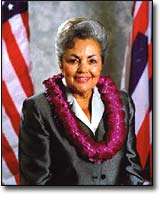Former Mayor Maryanne Kusaka’s vision of a Kaua‘i school district unto itself is one tailored to specific needs of students, staff and principals.´
By “empowering the principals,” and giving them money to spend on student and school needs, each school will be able to plan for and implement programs enabling them to lower student-to-teacher ratios in classrooms, make greater accommodations for special-needs students, and even plan for expansion of school physical plants, she explained.
“If it’s more resources, so be it. If it’s smaller classrooms,” the schools will decide, Kusaka continued. “Teachers and principals work very hard, but their resources are strapped.
“There is a desire to have control here over what’s happening with education. We’re trying to create the workforce of the future,” and if the public-school system doesn’t prepare island students for high-technology and other high-skill positions on Kaua‘i, “we’ll have to import expertise,” said Kusaka.
Principals and teachers will be the primary decision-makers under a decentralized, Kaua‘i-based school system, but parent and other public involvement will be important also, she said.
“Those who know best are teachers and principals,” said Kusaka, a former teacher and lone Kaua‘i member of Gov. Linda Lingle’s Citizens to Achieve Reform in Education (CARE) committee set up to work on education reform.
“I think we have to do what the community will support.” The community will also decide, she said. “Parents have to be involved and concerned.”
Decentralized (local) school districts, with elected local school boards, have proven successful at raising test scores in Mainland and Canada districts that have mixes of poor and not-so-poor students, from a variety of ethnic backgrounds, just like each school on Kaua‘i, she observed.
Kusaka is off to the next round of CARE meetings next week after the committee’s formal convening last week. She said a Kaua‘i meeting will be scheduled to talk about progress made toward decentralization.
She’ll bring back information she gathers to Kaua‘i principals and teachers and the community, and decentralization ideally will allow school leaders to develop programs to help specific student populations in need, she said.
Lingle, Kusaka and others support the placing on next fall’s general election ballot of a decentralization question to allow voters to decide.
“We need to provide a fair education for everyone,” said Kusaka.
“We can’t keep waiting around hoping that public education in Hawai‘i will get better, because it’s not going to just happen by itself,” said Lingle.
“Our CARE committee is a historic opportunity to work together on issues that will truly change education for our children. I consider this to be the most important group I have convened because it will result in life-time achievement for Hawai‘i’s students and our entire community,” the governor said.
CARE will work toward refining issues relating to decentralizing Hawai‘i’s education system to give more authority and subsequently more accountability to principals and teachers, Lingle said.
The information gathered will be used to help formulate legislation that will ultimately let the people of Hawai‘i decide the issue of local school boards, to replace the centralized system that has produced dismal results for many years, Lingle said.
“Teachers are just as frustrated as everyone else,” said Melanie Hanohano, a teacher at Kailua Elementary School and member of CARE. “Central control obviously isn’t working. We see that better than anyone.”
Supporting the committee’s ideas toward decentralization is University of California at Los Angeles professor Bill Ouchi, in Honolulu to meet with education officials, legislators and business groups.
Ouchi, a former Hawai‘i resident who is serving as an unpaid education consultant to the CARE committee, told members his research shows school education performance is directly affected by how education systems are structured.
The key is to empower each school community, especially the principal, and build in a system of accountability in terms of each school’s budget performance, student performance, and customer satisfaction, Ouchi said.
“No two gatherings of students are the same, which is why each school principal should be treated as an entrepreneur with decision-making authority and responsibilities,” said Ouchi.
“School districts around the country perform the best when principals control school budgets and are accountable for student achievement,” he said.
The all-volunteer CARE committee includes chief executive officers and other business leaders, state department heads, University of Hawai‘i education faculty members, teachers, a principal, and residents of each of the four counties.
On Kaua‘i, there are at least two schools of thought among principals: our school already gets enough money and autonomy; and we can’t wait to get our hands on funds allocated directly to the schools.
Associate Editor Paul C. Curtis can be reached at pcurtis@pulitzer.net or 245-3681 (ext. 224).


